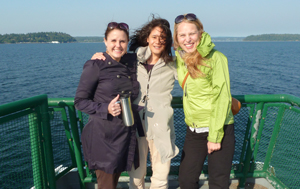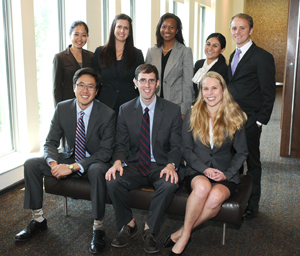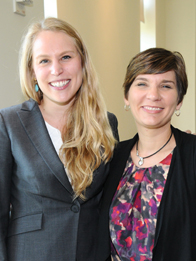You are here
A Year in the Life of a CDC Experience Fellow
I had a wonderful year as a CDC Experience Fellow in the Waterborne Disease Prevention Branch at CDC. I traveled to Seattle to examine the effectiveness of a whooping cough vaccine, analyzed community preparedness following a water emergency in Alabama (did you know that FEMA recommends households store 3 gallons of water for each person living in a house in case of an emergency?), examined geographic patterns of giardiasis (an intestinal parasite) in the U.S. and reviewed close to 250 waterborne disease outbreaks associated with hot tubs. Also, building on all I learned, I am helping the Baltimore City Health Department plan a seminar for religious leaders on end-of-life care.
 While at CDC, I had two main projects: an epidemiologic and geospatial analysis of Giardia lamblia, an intestinal parasite that causes prolonged diarrhea, or giardiasis, and an investigation of outbreaks associated with spas and hot tubs. For the giardiasis project, my team and I analyzed data from multiple sources, including the U.S. Census, the U.S. Department of Agriculture, and the National Notifiable Disease Surveillance System. We found that rates of giardiasis were higher in counties in which a high percentage of households used private wells. For the hot tub project (comical, I know), we reviewed hot tub outbreaks reported from 1978–2010. Our goal was to systematically collect data on the “who, what, where, when, and why” of the outbreaks. We were most concerned with the “why.” We assessed what factors, such as inadequate water disinfectant levels and high bather loads, contributed to each outbreak. Many of the contributing factors we identified will be incorporated into the Model Aquatic Health Code, a guide for updating swimming pool and spa codes and regulations.
While at CDC, I had two main projects: an epidemiologic and geospatial analysis of Giardia lamblia, an intestinal parasite that causes prolonged diarrhea, or giardiasis, and an investigation of outbreaks associated with spas and hot tubs. For the giardiasis project, my team and I analyzed data from multiple sources, including the U.S. Census, the U.S. Department of Agriculture, and the National Notifiable Disease Surveillance System. We found that rates of giardiasis were higher in counties in which a high percentage of households used private wells. For the hot tub project (comical, I know), we reviewed hot tub outbreaks reported from 1978–2010. Our goal was to systematically collect data on the “who, what, where, when, and why” of the outbreaks. We were most concerned with the “why.” We assessed what factors, such as inadequate water disinfectant levels and high bather loads, contributed to each outbreak. Many of the contributing factors we identified will be incorporated into the Model Aquatic Health Code, a guide for updating swimming pool and spa codes and regulations.
 Outside the realm of my waterborne disease work, for my fellowship capstone project, I am focusing on barriers to hospice utilization in Baltimore. Through conversations with the Baltimore City Health Department, I learned that hospice utilization rates in Baltimore City are among the lowest in the state of Maryland; in many parts of Baltimore, hospice utilization rates are about half of the national average. The health department’s Office of Aging had intended to plan a seminar to address common myths and misperceptions around hospice care; I am lending an extra set of hands to help get the seminar off the ground. This project has been a great opportunity to apply the public health theory I learned in our fellowship didactic sessions, including strategies for designing, implementing, and evaluating a public health intervention.
Outside the realm of my waterborne disease work, for my fellowship capstone project, I am focusing on barriers to hospice utilization in Baltimore. Through conversations with the Baltimore City Health Department, I learned that hospice utilization rates in Baltimore City are among the lowest in the state of Maryland; in many parts of Baltimore, hospice utilization rates are about half of the national average. The health department’s Office of Aging had intended to plan a seminar to address common myths and misperceptions around hospice care; I am lending an extra set of hands to help get the seminar off the ground. This project has been a great opportunity to apply the public health theory I learned in our fellowship didactic sessions, including strategies for designing, implementing, and evaluating a public health intervention.
The most significant lesson I learned as a CDC Experience Fellow is that public health problems are solved incrementally, through thorough data collection, precise analyses, and targeted interventions. My giardiasis analysis, for example, improves, but does not drastically alter, our understanding of giardiasis in the U.S. The hot tub review provides data to support already well-established hot tub maintenance guidelines. Finally, the hospice seminar is a small first step towards addressing common negative myths surrounding hospice care.
As I finish up my year, I look forward to using the skills, knowledge, and experience I gained at CDC, together with my clinical knowledge and skills from medical school, to continue to play a role in this incremental, important process of creating public health change. I will no longer, however, think of water, or hot tubs, in entirely the same way.
About the Program
 The CDC Experience Applied Epidemiology Fellowship is a one-year fellowship in applied epidemiology for medical students at the Centers for Disease Control and Prevention (CDC) in Atlanta. The fellowship is made possible through a public-private partnership supported by a grant to the CDC Foundation from Pfizer Inc.
The CDC Experience Applied Epidemiology Fellowship is a one-year fellowship in applied epidemiology for medical students at the Centers for Disease Control and Prevention (CDC) in Atlanta. The fellowship is made possible through a public-private partnership supported by a grant to the CDC Foundation from Pfizer Inc.
Photo captions: (Left) Kerry Schnell is pictured with her secondary supervisor, Julia Gargano; (Above left) Kerry with CDC Fellows traveling by ferry in Seattle to visit a clinic with a confirmed case of pertussis; (Above right) Kerry and the 2013 graduating class of CDC Experience Applied Epidemiology Fellows